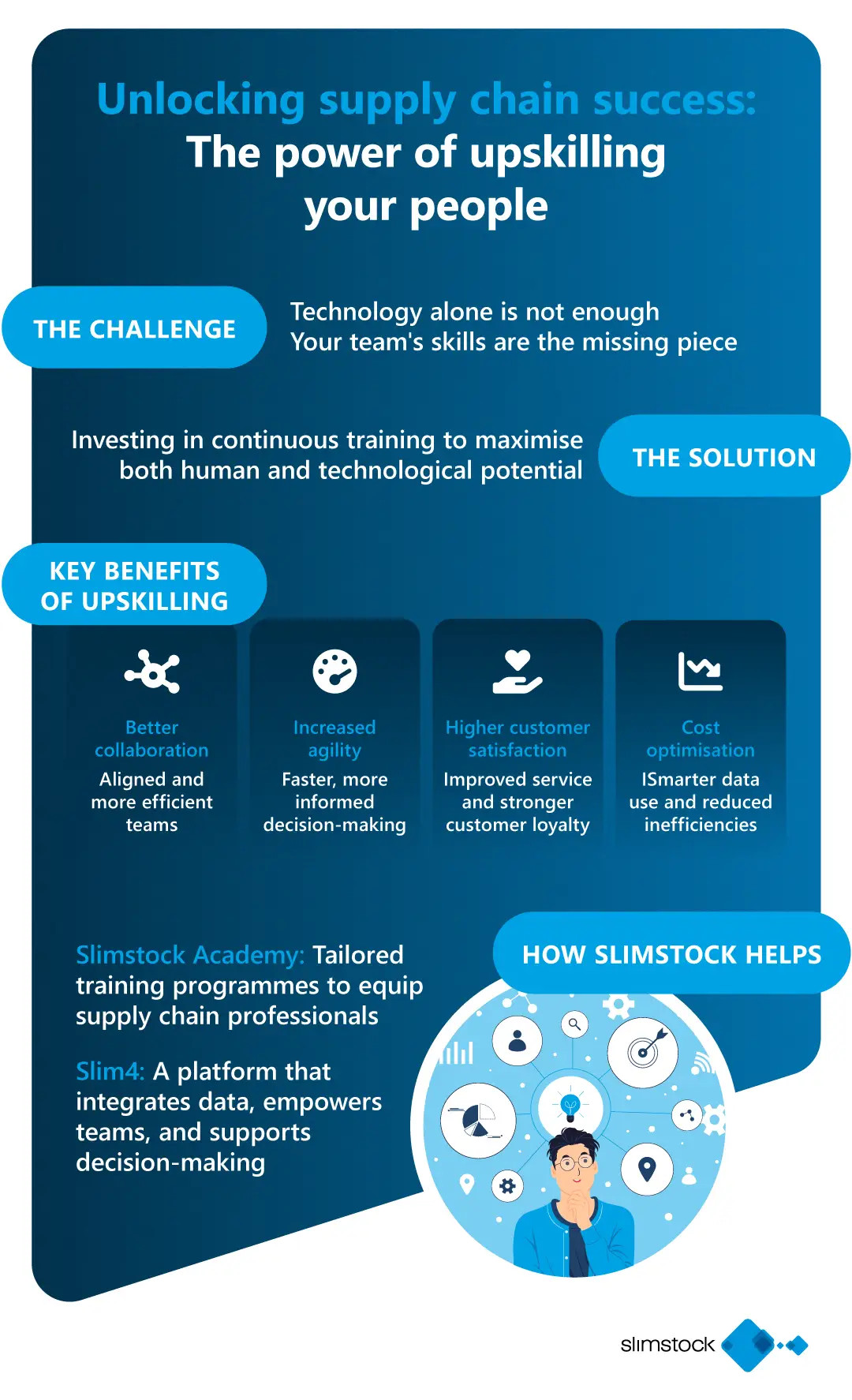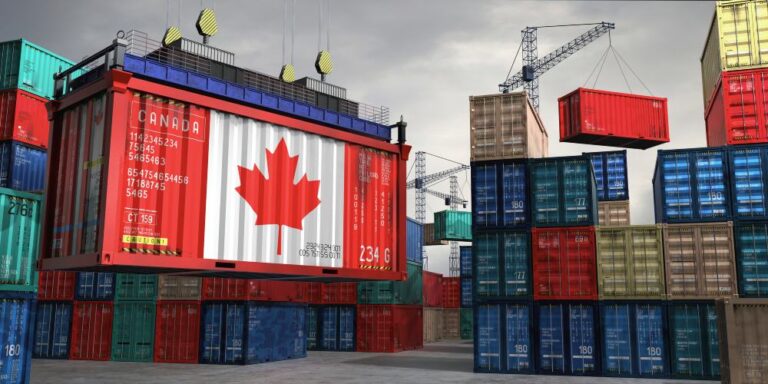Table of contents
Table of contents- How to Unlock Supply Chain Success by Upskilling Your People
- The Role of People
- How Can You Unlock the Full Potential of Your Supply Chain by Empowering Your People?
- The Power of Upskilling for Supply Chain Success
- The Impact of Upskilling on Supply Chain Performance
- How Slimstock Can Help You Upskill Your Team
- FAQs About Upskilling for Supply Chain Success
Overview
Unlocking supply chain success requires prioritizing people and upskilling them to effectively use technology, collaborate across departments and make informed decisions, as technology alone is not a silver bullet for increasing efficiency, agility, customer satisfaction and cost optimization.
There’s a temptation to look at the rise of technology, AI and emerging roles like that of the Chief Supply Chain Officer and assume the world of supply chain is becoming easier to manage.
The truth, however, is quite different. Supply chain has never been more complex or difficult to manage. Every advancement in technology aimed at overcoming challenges seems to introduce new ones.
Many businesses struggle because they expect technology—like AI and automation—to solve all their problems. It’s tempting to see these tools as silver bullets, but the reality is that the missing piece often lies elsewhere: with your people.
Your teams, their skills, leadership, collaboration, and processes, are what truly determine the success of your supply chain. People are the force that make technologies truly effective.
The Role of People
In every business, people matter. Technology and tools can amplify their efforts and make them shine, but only if they have the skills and confidence to use them effectively.
This is both a potential strength and a vulnerability. While new technology might promise sweeping improvements, its effectiveness depends entirely on the abilities of the people using it.
This isn’t news to Slimstock customers. We dedicate significant time and resources to ensuring every single client is up to speed, comfortable, and confident in using the tools we provide. But knowing that your people are critical, and actively addressing their development, are two very different challenges.
Unlocking the full potential of your supply chain starts with acknowledging that technology alone isn’t enough.
How Can You Unlock the Full Potential of Your Supply Chain by Empowering Your People?
The first step toward achieving supply chain success is realizing that technology alone isn’t the answer.
You might already understand this, but there’s a big difference between knowing it and implementing a strategy to improve your team’s skills. This is where many companies fall short.
We’ve seen how top-down approaches can work wonders. Simply wanting to improve your team’s abilities isn’t enough. You need structured processes and, often, external expertise to help unlock their full potential.
Upskilling isn’t just about training your team for the challenges of today—it’s about preparing them for the future. It requires fostering collaboration, improving leadership, and providing employees with opportunities to grow and contribute to the bigger picture.
The Power of Upskilling for Supply Chain Success
One of the most significant barriers to supply chain success is viewing upskilling as a one-off activity. Yes, there’s an immediate need to ensure your team understands the tools they use daily. But real success comes from investing in their long-term development.
This means looking beyond their current responsibilities. How are you addressing their long-term improvement? Are you looking beyond their current job? Are you including them in meetings and conversations which broaden their horizons in supply chain?
Well-trained employees can manage new technology far better than those winging it. But beyond that, the better trained, and better equipped your team are, the more informed decisions they can make, improving the overall performance of your business.
In a recent talk during the Slimstock Customer Day, Dave Food explored this very point. He shared the story of John, a Procurement professional, who attended a training session on upskilling within Integrated Business Planning. At the start of the session, John admitted he didn’t know why he was there.
This reaction is not unusual. Many employees, like John, may not immediately see the relevance of such sessions to their role. They might feel planning is outside their remit or struggle to understand how their work contributes to the wider strategy.
There’s a temptation for these individuals to feel they’re not adding value and could spend their time more productively elsewhere. Some may even believe they don’t need to be in the room at all—that a simple email summary would suffice.
But planning, like so many areas in supply chain, is all about collaboration. John recounted an instance where he identified a discount on an SKU and ordered four months’ worth in one go to secure it. It was a KPI ticked off for John, and a saving made for the business.
However, shortly after delivery, there was a phone call from the warehouse asking where they planned on storing their new surplus. In John’s case, it meant off-site storage, at an increased cost, and wastage from breakages.
And so John, and others like him, whilst not responsible for planning, are very much a part of it. His involvement in the broader planning process could have avoided such unintended consequences, highlighting the importance of collaboration across roles.
To support this kind of alignment and decision-making across departments, tools like Slimstock’s IBP solution can play a valuable role.
Planning should be about collaborating with colleagues. It should be about working together to plan for the business, and finding solutions so the company works seamlessly.
Whether it’s planning or any other part of your business, upskilling is key to fostering this collaboration and ensuring long-term success.
The Impact of Upskilling on Supply Chain Performance
The wider benefits of upskilling your people are potentially huge. It’s not simply about including them in meetings or emails they don’t feel valued in. It’s about showing them that value and what these longer term benefits can be, with the right knowledge and involvement.
Below is a non-exhaustive list of benefits to your business from upskilling your people.
1. Improved Collaboration and Coordination
If John’s story above proves anything, it’s that upskilling improves collaboration across departments.
Procurement might not feel as though planning is part of their remit, but it can quickly become so. The same can be said for Marketing, Finance and every other department in your company. Ensure everyone’s aligned and working toward the same goals, and those goals will be achieved far more successfully.
2. Increased Efficiency and Agility
A well-trained team can make quicker, more accurate decisions.
That’s always been a sign of a successful business, but in today’s rapidly moving supply chain landscape, it’s absolutely crucial. The more able your team is, the more efficient they’ll be. And with efficiency comes agility.
3. Customer Satisfaction
A well-trained workforce can respond to customer demands more quickly, maintain good inventory levels, and streamline logistics.
It’s no secret this will lead to better customer service, and well-serviced customers are happy customers, who in return give you repeat business, a better bottom line and improved brand to boot.
4. Cost Optimisation
Skilled employees know how to leverage data. They can often bring different perspectives on common problems, help with optimising processes, reducing inefficiencies, and ultimately improve cost savings across the company.
How Slimstock Can Help You Upskill Your Team
At Slimstock, we understand the transformative power of upskilling. That’s why we offer a range of resources to support your team’s growth:
- Slimstock Academy: Tailored training programs designed to empower supply chain professionals with the skills they need to thrive.
- Slim4 Platform: A cutting-edge tool that integrates data, supports decision-making, and fosters collaboration across teams.
All of these together make it easier for employees to apply their knowledge and improve their processes. We know that a well-connected team, with open communication can be the secret sauce in creating a well-functioning supply chain. The companies we work with receive ongoing support and expertise to help evolve their planning processes, and keep up-to-date with the latest supply chain best practices.
There’s also a huge link between leveraging technology and training together. The synergy between technology and upskilling is clear. One helps the other. But one, without the other, can create problems and actually set businesses back.
This highlights the importance of flexible training and tools that adapt to the changing needs of your business. Like the training and platform offerings by Slimstock, it’s crucial to engage partners who place the right emphasis on these parts of your organisation. If you’d like to explore how Slimstock can help your business improve, by upskilling your people, click here.
FAQs About Upskilling for Supply Chain Success
Why is upskilling essential for supply chain success?
Upskilling equips employees with the knowledge and tools to manage new technologies, adapt to changing demands, and collaborate effectively. This not only improves decision-making but also enhances overall business performance.
How often should we invest in upskilling initiatives?
Upskilling should be an ongoing process, not a one-off activity. Regular training ensures your team stays current with industry trends and emerging technologies, fostering long-term growth and adaptability.
What areas of the supply chain should be prioritised for upskilling?
Focus on areas where technology and collaboration are critical, such as Integrated Business Planning, inventory management, and data analytics. However, it’s important to tailor training to the specific needs of your organisation and workforce.
How does upskilling improve collaboration in the supply chain?
Upskilling ensures that team members understand how their roles intersect with others in the organisation. This shared understanding fosters better communication, reduces silos, and promotes seamless operations across departments.






